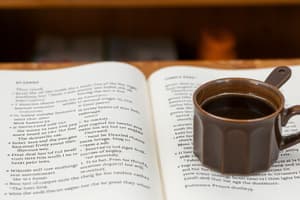Podcast
Questions and Answers
What is an objective summary?
What is an objective summary?
A brief, unbiased statement explaining the important information in a text or speech.
What does literature encompass?
What does literature encompass?
All written work; particularly fiction, poetry, or drama.
What characterizes informational text?
What characterizes informational text?
Non-fiction, written work whose purpose is to tell the reader facts or ideas.
What is genre in writing?
What is genre in writing?
What does purpose refer to in writing?
What does purpose refer to in writing?
What is prose?
What is prose?
What is academic vocabulary?
What is academic vocabulary?
What is the author's viewpoint?
What is the author's viewpoint?
What does explicit mean in writing?
What does explicit mean in writing?
What does inferred mean?
What does inferred mean?
What are the elements of a story?
What are the elements of a story?
What is the setting of a story?
What is the setting of a story?
Who are the characters in a story?
Who are the characters in a story?
What is conflict in a story?
What is conflict in a story?
What is the climax of a story?
What is the climax of a story?
What does theme refer to in literature?
What does theme refer to in literature?
What is the plot of a story?
What is the plot of a story?
What is resolution in a story?
What is resolution in a story?
What is evidence in writing?
What is evidence in writing?
What is diction in writing?
What is diction in writing?
What is imagery in literature?
What is imagery in literature?
What are details in a narrative?
What are details in a narrative?
What does structure refer to in writing?
What does structure refer to in writing?
Flashcards are hidden until you start studying
Study Notes
Key Literary Terms and Concepts
- Objective Summary: A neutral, concise explanation of key information presented in a text or speech.
- Literature: Encompasses all forms of written works, especially in genres like fiction, poetry, and drama.
- Informational Text: Non-fiction writing designed to deliver facts or ideas to the reader.
- Genre: Classification of writing that includes various categories such as poetry, novels, and informational texts.
- Purpose: The intended goal or reason behind the writing.
Writing Styles and Techniques
- Prose: Standard writing format characterized by normal sentence and paragraph structure, differing from poetry or drama.
- Academic Vocabulary: Specialized terms essential for grasping concepts taught in educational settings.
- Author's Viewpoint: The author's personal stance or opinion regarding the subject matter.
Literary Elements
- Explicit: Information that is clearly articulated and directly stated; represents denotation.
- Inferred: Meaning that is suggested or implied rather than directly expressed; relates to connotation.
- Elements of Story: Fundamental components every narrative must have.
- Setting: Refers to the time and place where the narrative unfolds.
- Characters: Individuals or animals who participate in the story's events.
- Conflict: The central struggle or issue faced by the protagonist in the narrative.
- Climax: The peak of tension in the story where the central conflict reaches its resolution.
- Theme: The overarching message or lesson the story conveys to the audience.
- Plot: The sequence of interconnected events that form the storyline.
- Resolution: The outcome of the conflict, occurring after the climax.
Language and Style
- Evidence: Material or proof supporting claims or ideas.
- Diction: The selection of words used by the author, influencing tone and meaning.
- Imagery: Descriptive writing that evokes visual representations in the reader's imagination.
- Details: Specific information or insights that enhance understanding of the subject.
- Structure: The arrangement and organization of a piece of writing, influencing its effectiveness.
Studying That Suits You
Use AI to generate personalized quizzes and flashcards to suit your learning preferences.



